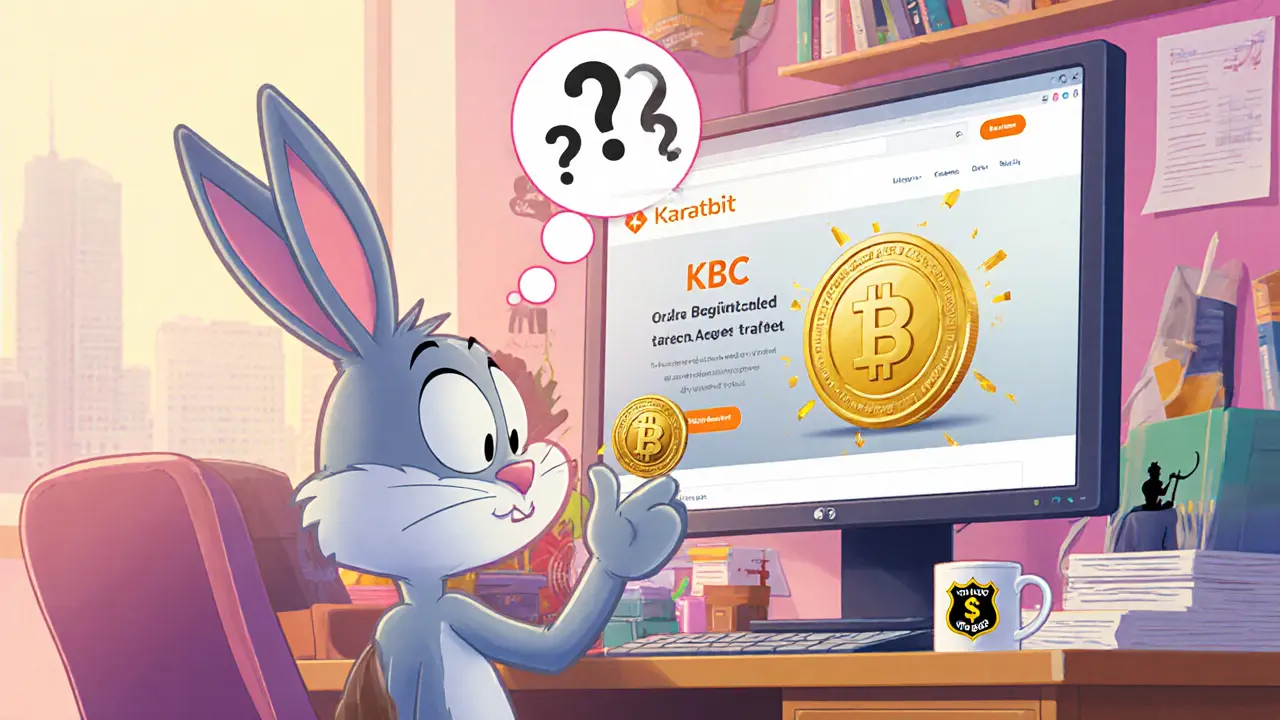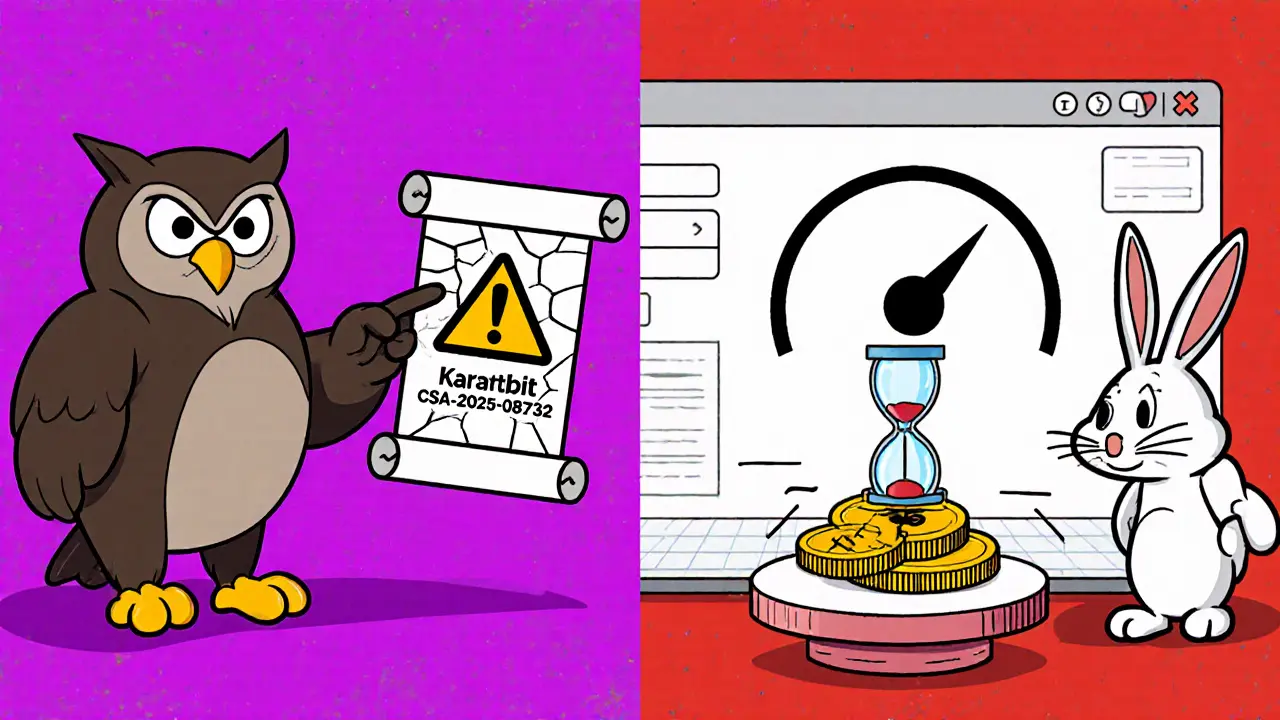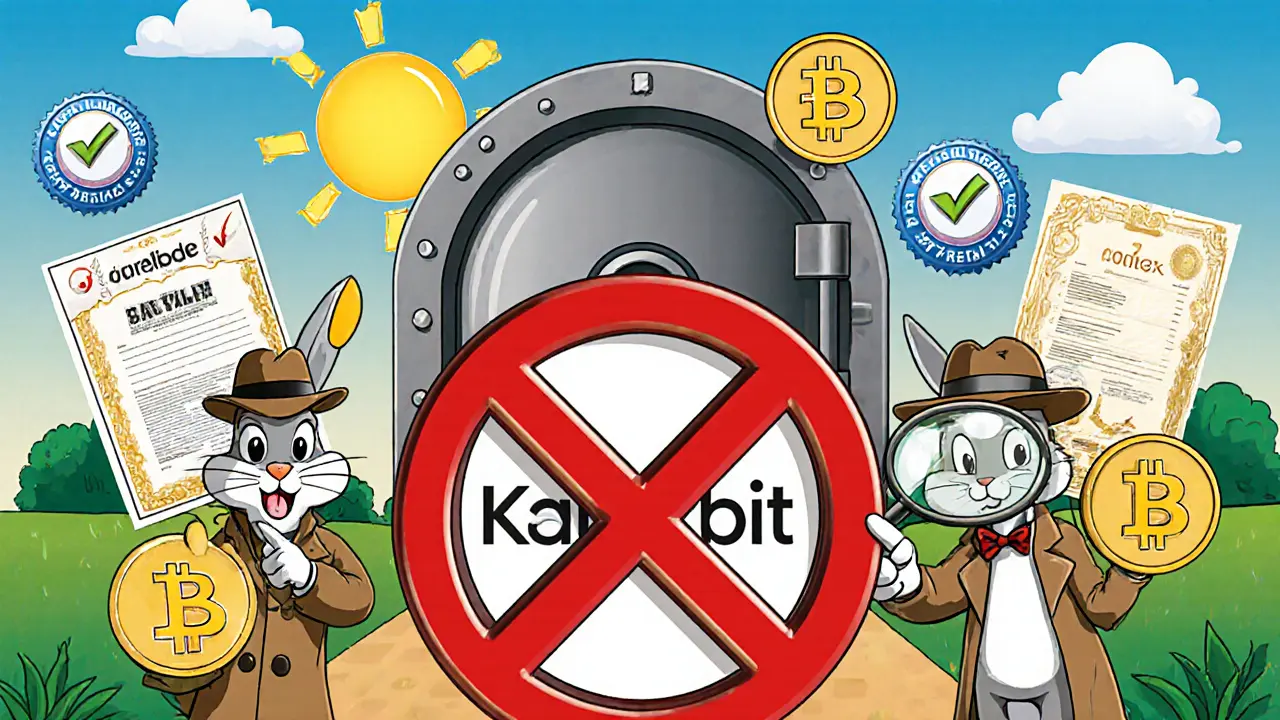
Karatbit Withdrawal Risk Calculator
Karatbit Withdrawal Warning
Red Flag: Karatbit requires referral of new users before processing withdrawals. As noted in their October 2025 user reports, a SGD 1,200 withdrawal was blocked until five new users were referred within 72 hours.
Regulatory Status: No license from any financial authority. Listed on Canadian Securities Administrators (CSA), UK Financial Conduct Authority, and Singapore Monetary Authority watchlists.
If you’ve stumbled across the name Karatbit while hunting for a place to trade crypto, you probably have a lot of questions. Does it actually work? Is it safe? And how does it stack up against big‑name platforms like Binance or Coinbase? This review pulls together the latest data, regulator alerts, and real user experiences to give you a clear picture of what you’re signing up for.
What is Kararbit?
Karatbit is a cryptocurrency exchange that launched on February 3, 2019, and is registered under Karat Gold Cooperation PTE. LTD. in Singapore. The platform’s core offering is trading the Karatgold Coin (KBC), a token that claims to be backed by physical gold. Unlike mainstream exchanges that support hundreds of coins, Karatbit focuses almost exclusively on KBC and a handful of other low‑volume assets.
Regulatory standing - why it matters
The first red flag shows up in the regulatory department. As of October 2025, Karatbit has no licence from any recognized financial authority. The Canadian Securities Administrators (CSA) listed the exchange in their official investor‑alert database, labeling it a high‑risk scheme (alert number CSA‑2025‑08732). TradersUnion’s October 2025 assessment echoed the same concern, stating that the platform “is not regulated by any recognized financial authority.”
Without regulatory oversight, your funds sit in a legal vacuum. If the exchange freezes your account or disappears, there’s no regulator to force a refund or investigation. By contrast, exchanges like Binance and Coinbase hold licenses in multiple jurisdictions and must comply with anti‑money‑laundering (AML) and know‑your‑customer (KYC) rules.
Technical performance - does the platform even work?
User reviews on Revain.org collected in October 2025 repeatedly mention slow load times and a UI riddled with blank spaces. One reviewer wrote, “The exchange has a lot of blank spaces and it takes a really long time to load the webpage.” No uptime statistics are published, whereas CryptoCompare’s 2025 benchmark shows top exchanges maintaining 99.9% uptime.
The exchange’s connection to KBC adds another layer of technical risk. KBC runs on the Ethereum blockchain but has only three active trading pairs across all markets and a 24‑hour volume of roughly $12,450 (CoinGecko, Oct 15 2025). Compare that with USDT’s daily volume of $52 billion - the liquidity is practically non‑existent, making it hard to enter or exit positions without slippage.
Security - what protects your assets?
Security details are scarce. There is no public cold‑storage percentage, no third‑party audit report, and no proof‑of‑reserves document. In the world of crypto, exchanges like Kraken and Bitstamp publish these metrics to prove that the majority of user funds are kept offline.
ISO‑27001 certification and SOC 1 Type 2 compliance are standard for reputable platforms (Korbit, Binance, Coinbase). Karatbit offers none of these certifications, leaving you without any external verification that security best practices are followed.

Fees and withdrawal mechanics - are they fair?
The fee structure is vague. The website’s archived Help Center (Wayback Machine, Oct 15 2025) lists only a flat 0.2% trading fee but omits withdrawal fees. More troubling is the withdrawal requirement that forces users to refer new members before a withdrawal is processed. A trader on TradingView’s forum reported that a SGD 1,200 withdrawal was blocked until five new users were referred within 72 hours - a classic pyramid‑scheme trigger identified by the CSA.
Comparison with regulated exchanges
| Feature | Karatbit | Binance | Coinbase |
|---|---|---|---|
| Regulatory licences | None | Multiple (Singapore, Malta, US) | US, EU, UK licences |
| Security certifications | No ISO/ SOC | ISO‑27001, SOC 2 | ISO‑27001, SOC 1 |
| Supported assets | KBC + 2 low‑volume tokens | 5,000+ coins & tokens | 200+ coins & tokens |
| Liquidity (24‑h volume) | ~$12K (KBC) | $1.8 T (Binance Sep 2025) | $500 B (Coinbase Sep 2025) |
| KYC requirements | Email only, no ID | 6‑step ID, selfie, proof of address | Full ID & facial verification |
| Withdrawal limits | Referral‑based, unpredictable | Tiered limits, transparent | Tiered limits, transparent |
| Customer support | Limited FAQ, slow response | Live chat, 24/7 support | Phone, email, live chat |
User experiences - real stories from the trenches
Between January and October 2025, Revain.org logged 18 verified complaints about Karatbit. The most common issues were blocked withdrawals and unresponsive support. One user, ‘GoldSaver2025’, deposited SGD 2,500 worth of KBC, only to see the token disappear after an unscheduled UI change - the support team never answered 17 email attempts over a month.
Reddit’s r/CryptoScams subreddit contains 43 posts mentioning Karatbit since the start of 2025. A thread by u/BlockchainWatcher shared screenshots of a SGD 7,800 loss after the platform claimed a “KYC issue” that never resolved. The pattern aligns with the CSA’s description of “characteristics commonly associated with high‑risk investment schemes.”

Expert consensus - what the regulators and analysts say
Multiple authorities have put Karatbit on watchlists:
- Canadian Securities Administrators - investor alert (CSA‑2025‑08732)
- UK’s Financial Conduct Authority - listed under “Report Scam Companies”
- Singapore’s Monetary Authority - included in the “Scam Alert” list (Oct 12 2025)
Compliance specialist Mark Reynolds of TradersUnion summed it up: “The absence of any regulatory framework means client funds operate in a legal vacuum where recovery mechanisms don’t exist.” Dr. Elena Rodriguez’s 2025 paper on gold‑backed crypto fraud identified Karatbit as meeting seven of nine red flags, including unverifiable gold reserves and excessive referral commissions.
Market outlook - is there any future for Kararbit?
The global gold‑backed crypto market was worth $2.3 billion in Q3 2025, but legitimate players like the Perth Mint’s PMGT token dominate 89% of that volume. Karatbit’s “untracked” status on CoinMarketCap, combined with dwindling KBC price (down 83% from $0.082 in Jan 2025 to $0.014 in Oct 2025), signals a platform that is losing relevance fast.
J.P. Morgan’s Digital Asset Report (Oct 15 2025) predicts a 90% failure rate for unlicensed gold‑backed exchanges within 18 months. Forbes quoted crypto analyst David Chen saying, “Platforms operating without regulatory oversight in 2025 face existential risk - Karatbit’s structure makes recovery impossible if funds are lost.”
Verdict - should you use Kararbit?
Putting the pieces together, the answer is clear: avoid Karatbit. The lack of regulation, undefined security measures, negligible liquidity, and a trail of user complaints make it a high‑risk proposition. If you want to trade crypto, stick with exchanges that hold licenses, publish audit reports, and have transparent fee structures.
For anyone still curious about gold‑backed tokens, look toward established projects like the Perth Mint Gold Token (PMGT) or the regulated offerings on platforms such as Binance or Coinbase, where you can verify reserves and benefit from strong consumer protection.
Is Karatbit a legitimate crypto exchange?
No. Karatbit operates without any recognized financial licence, appears on multiple regulator watchlists, and lacks basic security certifications, making it non‑legitimate in the eyes of most authorities.
Can I safely withdraw my funds from Karatbit?
Withdrawals are unreliable. Users report blocked withdrawals unless they refer new members, and support often does not respond, leaving funds effectively locked.
What is the Karatgold Coin (KBC) and does it really hold gold?
KBC claims to be backed by physical gold, but the exchange provides no audit or proof‑of‑reserves. Regulators have flagged the token for unverifiable gold reserves, so the claim is unsubstantiated.
How does Karatbit’s liquidity compare to major exchanges?
Karatbit’s 24‑hour volume is around $12,000 for KBC, whereas Binance trades over $1.8 trillion monthly and Coinbase handles $500 billion. The liquidity gap makes it hard to trade without large price impact.
Are there any reputable alternatives for gold‑backed crypto?
Yes. The Perth Mint Gold Token (PMGT) is listed on regulated exchanges and is audited by the mint itself. It offers far better transparency and liquidity than KBC on Karatbit.

Chris Houser
October 24, 2025 AT 08:45When assessing a platform like Karatbit, you want to look at the KYC workflow, liquidity depth, and the asset‑backed token mechanics. The lack of a proper audit trail means the gold backing is essentially speculative. Also, the thin order book creates slippage risk for any sizeable trade. Overall, the risk‑reward profile leans heavily toward risk. If you’re just testing the waters, stick to regulated venues.
William Burns
October 29, 2025 AT 09:10One must consider, with utmost rigor, the regulatory vacuum that pervades this establishment. The absence of licensure is not merely a clerical oversight but a substantive breach of fiduciary duty. Moreover, the platform’s opacity regarding cold‑storage engenders an untenable trust deficit. Such deficiencies are antithetical to the principles of sound financial stewardship. Consequently, any participation would be ill‑advised.
Ashley Cecil
November 3, 2025 AT 10:34Ethically speaking, the promotion of a token alleged to be gold‑backed without verifiable reserves is a deception of the highest order. Consumers are being lured by the allure of tangible assets while the underlying infrastructure remains opaque. The regulatory bodies have duly flagged this conduct as high‑risk, reinforcing the moral imperative to abstain. In light of these facts, endorsing such a platform would contravene basic principles of honesty.
Jennifer Rosada
November 8, 2025 AT 11:59From a compliance perspective, the paperwork – or lack thereof – is a glaring red flag that overshadows any superficial marketing narrative. The forced referral mechanism for withdrawals is a textbook pyramid schema, and seasoned analysts would categorically reject involvement. While the tone may appear benign, the underlying operational model is fundamentally exploitative. Therefore, any engagement is tantamount to endorsing fraud.
John Dixon
November 13, 2025 AT 13:24Oh great, another crypto “innovation”, huh?; The platform promises gold‑backed security, yet offers no proof; The fee structure is as clear as mud; Good luck getting your money out without a referral marathon!
Brody Dixon
November 18, 2025 AT 14:49I hear your frustration, and it’s completely understandable. Platforms that lock you out of your own funds just aren’t worth the hassle.
Mike Kimberly
November 23, 2025 AT 16:13In evaluating Karatbit, one must adopt a holistic framework that encompasses regulatory compliance, technical robustness, tokenomics, and user experience.
The first pillar, regulatory compliance, is critically absent, as the exchange operates without any recognized financial licence, placing it outside the jurisdictional safety nets that protect investors.
Second, the technical infrastructure appears rudimentary; reports of sluggish page loads and UI anomalies suggest insufficient engineering resources.
Third, the tokenomics of the Karatgold Coin (KBC) are dubious, given the scant trading volume of approximately twelve thousand dollars daily, which undermines liquidity.
From a market microstructure perspective, such low depth inevitably leads to significant slippage for any non‑trivial order.
Furthermore, the absence of publicly disclosed cold‑storage ratios or third‑party audits raises serious custodial risk.
Without proof‑of‑reserves, users cannot verify whether the purported gold backing truly exists.
The fee schedule, while nominal at 0.2% per trade, hides ambiguous withdrawal costs and the coercive referral requirement.
Such a mechanism is reminiscent of pyramid structures that have been condemned by multiple securities regulators.
Customer support, as evidenced by delayed responses and generic FAQs, fails to meet the service standards expected of reputable exchanges.
Comparatively, industry leaders like Binance and Coinbase maintain transparent governance, comprehensive security certifications, and robust support channels.
The stark contrast in operational maturity further accentuates Karatbit’s marginal standing within the crypto ecosystem.
From a risk management standpoint, the platform’s exposure to regulatory action, technical failures, and liquidity crunches is disproportionately high.
Investors seeking to preserve capital or achieve reliable execution would be prudent to allocate funds elsewhere.
In essence, the confluence of regulatory void, technical inadequacies, opaque token assurances, and punitive withdrawal policies constructs a high‑risk investment proposition.
Consequently, the most judicious course of action is to avoid Karatbit and gravitate toward exchanges with verifiable compliance and proven track records.
Patrick Rocillo
November 28, 2025 AT 17:38Wow, that's a deep dive! 🌊 Your breakdown reads like a crypto‑detective novel, and I love the detail. Still, I’d add that the community vibe feels like a ghost town-no buzz, no memes. If you ever stumble upon a golden rabbit hole, let us know! 🚀
Santosh harnaval
December 3, 2025 AT 19:03Looks like a scam to me.
Marianne Sivertsen
December 8, 2025 AT 20:27In my view, the allure of quick gains often blinds us to the deeper ethical implications, and stepping back to reflect can save a lot of heartache. The market is full of glittering promises, but true value stems from transparency and trust. Let’s keep our discussions grounded and help each other navigate these murky waters.
Shruti rana Rana
December 13, 2025 AT 21:52Alas, the saga of Karatbit unfolds like a tragic opera, where the chorus of regulators sings a mournful warning. The purported gold reserves remain an enigma, shrouded in the fog of corporate secrecy. Investors, take heed; the stage is set for a potential downfall. 🎭📉
Stephanie Alya
December 18, 2025 AT 23:17Oh sure, because nothing says ‘trustworthy’ like a gold‑backed token with no audit. 🙄 If you enjoy gambling with your savings, go ahead, but don’t be surprised when the curtain falls.
olufunmi ajibade
December 24, 2025 AT 00:41Listen up, everyone-this platform is a textbook example of how NOT to run a legitimate business. Who actually believes a token backed by ‘gold’ without a single piece of verifiable proof? The regulatory red flags are screaming louder than any marketing hype. I’m telling you, steer clear before you lose everything.
Manish Gupta
December 29, 2025 AT 02:06Hey man, do you think there’s any chance they’ll get licensed soon? 🤔 I’ve seen some projects turn around, but the odds feel slim.
Gabrielle Loeser
January 3, 2026 AT 03:31Dear community, it is essential to approach such offerings with a measured and informed perspective. The lack of licensing, audit transparency, and robust customer support collectively signify substantial risk. I recommend allocating capital only to platforms that satisfy regulatory and security standards. Your financial safety should remain paramount.
Cyndy Mcquiston
January 8, 2026 AT 04:56We don’t need foreign scams draining our money.
Abby Gonzales Hoffman
January 13, 2026 AT 06:20Let’s break down the key takeaways: first, regulatory oversight is non‑existent, which eliminates any safety net for users; second, the token’s liquidity is abysmal, making trades costly; third, the withdrawal process is essentially a referral scheme, which is unacceptable; fourth, reputable alternatives like Binance, Coinbase, or regulated gold‑backed tokens offer far superior security and transparency; finally, always perform due diligence and never invest more than you can afford to lose. Staying informed is the best defense against these shady platforms.
Rampraveen Rani
January 18, 2026 AT 07:45Got it! 👍 Stay safe and trade smart! 🚀